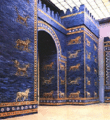Counsels of Wisdom
Counsels of Wisdom is a piece of Babylonian wisdom literature written in Akkadian[1] containing moral exhortations.[2] It is composed primarily of two-line units,[3] without sections.[4] A translation of extant portions of the text was published in Lambert 1996. Existing manuscripts are fragmentary, but the original was estimated to be about 160 lines.[2]
Date of authorship
[edit]Scholars disagree on the date of the work. Gemser and Frans de Liagre Böhl placed it in the First Dynasty,[5] but Lambert believes it should be dated to the Kassite period.[6] The work is attested primarily by a stone tablet written in Late Babylonian script.[6]
Comparison with other wisdom literature
[edit]The text is addressed to "my son", which may be a physical son, a student, a successor, or a trope of the genre, as it is in later wisdom literature.[2] Scholars have observed several pieces of ancient wisdom literature to be similar, including the Instructions of Shuruppak, Counsels of a Pessimist, and the Hymn to Šamaš . Together these works were an ancient genre.[6] Similarities have been noticed with the Book of Proverbs, but no literary dependence has been found.[7] The Counsels of Wisdom is believed to have been somewhat popular in its time, since fragments of this passage are quoted in other extant works.[2] The work may have influenced the Wisdom of Ahiqar.[8]
Kindness to Evildoers
[edit]Biblical scholar John Nolland sees a passage in the Counsels of Wisdom as a possible precursor to Jesus' command to "love your enemies": "Do not return evil to the man who disputes with you; requite with kindness your evil-doer... smile on your adversary."[9]
See also
[edit]Notes
[edit]- ^ Kitchen 1977, p. 114.
- ^ a b c d Lambert 1996, p. 96.
- ^ Kitchen 1977, p. 88.
- ^ Kitchen 1977, p. 86.
- ^ Böhl, Frans Marius Theodor de Liagre (1942). "De zonnegod als de beschermer der nooddruftigen" [The sun god as the protector of the poor]. Jaarbericht Ex Oriente Lux (in Dutch). 8. Leiden: Vooraziatisch-Egyptisch Gezelschap: 665–680, at p. 670. ISSN 0075-2118. OCLC 643516029.[verification needed]
- ^ a b c Lambert 1996, p. 97.
- ^ Whybray 2009, p. 51.
- ^ Greenstein 2022, p. 307.
- ^ Nolland 2005, p. 265.
References
[edit]- Greenstein, Edward L. (2022). "Wisdom in Mesopotamia in relation to von Rad's Wisdom in Israel". In Sandoval, Timothy J.; Schipper, Bernd U. (eds.). Gerhard von Rad and the Study of Wisdom Literature. Ancient Israel and its literature. Atlanta: SBL Press. pp. 287–320. ISBN 978-1-62837-450-6.
- Barré, Michael L. (1981). ""Fear of God" and the World View of Wisdom". Biblical Theology Bulletin. 11 (2). SAGE Publications: 41–43. doi:10.1177/014610798101100203. S2CID 170183050.
- Kitchen, Kenneth A. (1977). "Proverbs and wisdom books of the ancient Near East: the factual history of a literary form" (PDF). Tyndale Bulletin. 28: 69–114. doi:10.53751/001c.30617. Archived from the original (PDF) on 18 May 2012. Retrieved 16 April 2017.
- Lambert, Wilfred G. (1996) [1960]. Babylonian Wisdom Literature. Eisenbrauns. pp. 96–107. ISBN 978-0-931464-94-2.
- Nolland, John (2005). The Gospel of Matthew: A commentary on the Greek text. The New International Greek Testament Commentary. Grand Rapids, Michigan: William B. Eerdmans Publishing Company. ISBN 978-0-8028-2389-2.
- Whybray, R.N. (2009). Wisdom in Proverbs: The Concept of Wisdom in Proverbs 1-9. Studies in Biblical Theology, First Series. Wipf & Stock Publishers. ISBN 978-1-60899-019-1.
Further reading
[edit]- Begg, Christopher T.; Duggan, Michael W.; Hieke, Thomas (2022). "The Ancient Near East: Texts, Traditions, etc". Old Testament Abstracts. 45 (2): 346–382. doi:10.1353/ota.2022.0054. ISSN 2639-2003.
- Clifford, R.J. (2011). The wisdom literature. Interpreting Biblical Texts. Abingdon Press. p. 11. ISBN 978-1-4267-5001-4.
- Cohen, Yoram (2013). Wisdom from the late Bronze Age. Writings from the ancient world. SBL Press. ISBN 978-1-58983-754-6.
- Denning-Bolle, Sara J. (1987). "Wisdom and Dialogue in the Ancient Near East". Numen. 34 (2): 214–234. doi:10.1163/156852787X00038. ISSN 0029-5973. JSTOR 3270085.
- Lenzi, Alan (2018). "'Counsels of Wisdom' as 'white-collar' wisdom in first millennium ancient Mesopotamia". In Oshima, Takayoshi M. (ed.). Teaching morality in antiquity: Wisdom texts, oral traditions, and images. Orientalische Religionen in der Antike. Vol. 29. Tübingen: Mohr Siebeck. pp. 60–69. doi:10.1628/978-3-16-156481-9. ISBN 978-3-16-156480-2. ISSN 1869-0513 – via Academia.edu.
- Lenzi, Alan (2021). "Counsels of Wisdom: An ancient Babylonian instruction for scribal students". Religion Compass. 15 (3). doi:10.1111/rec3.12390. ISSN 1749-8171.
- Greenfield, Jonas C. (2001). "The Wisdom of Aḥiqar". In Paul, Shalom M.; Stone, Michael E.; Pinnick, Avital (eds.). 'Al Kanfei Yonah. Collected Studies of Jonas C. Greenfield on Semitic Philology. Vol. 1. Leiden: Brill. pp. 334–343. doi:10.1163/9789004532014_038. ISBN 978-90-04-53201-4.
- Perdue, L.G. (2008). The sword and the stylus: An introduction to wisdom in the age of empires. Eerdmans Publishing Company. p. 7. ISBN 978-0-8028-6245-7.
- Martins, Ivo Ricardo dos Santos (2017). Liminality and the social functions of Akkadian Wisdom Literature (ca. 1200–458 BCE) (M.A. thesis). Leiden University – via Academia.edu.
- Martins, Ivo Ricardo dos Santos (13 August 2024). "Reframing wisdom through liminality in Akkadian literature". In De Martin, Sara; Furlan, Anna Lucia (eds.). Wisdom Discourse in the Ancient World. London: Routledge. p. 21-27. doi:10.4324/9781003485094-2. ISBN 978-1-03-277858-7.
External links
[edit]- II.3 Counsels of Wisdom Critical edition and translation of the text (electronic Babylonian Library).
- Counsels of Wisdom (SAT translation).

